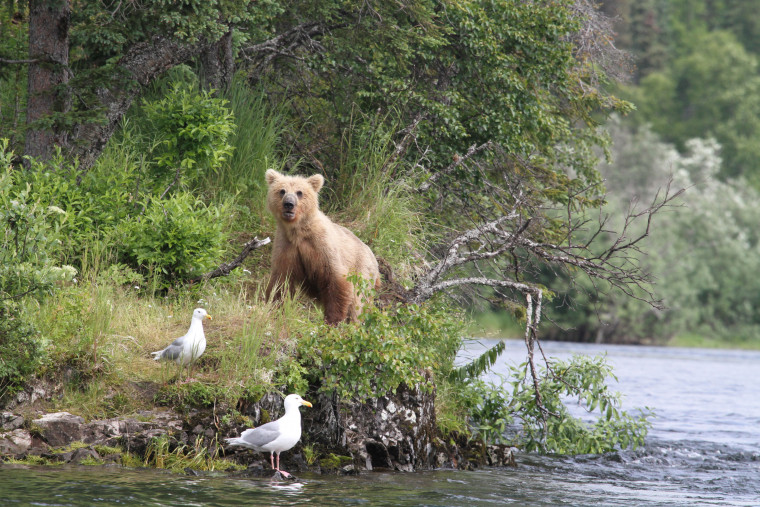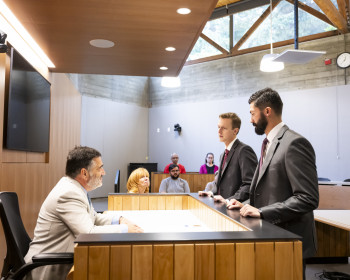Alumni Work to Protect Pristine Alaskan Watershed
Open gallery

The alums work for Trustees for Alaska and their work helped lead the U.S. Army Corps of Engineers (Army-Corps) to deny a Clean Water Act (CWA) Section 404 permit in November for a proposed mine project in the pristine Bristol Bay.
Brian Litmans (JD ’01), Legal Director at Trustees for Alaska, Katie Strong (JD ’08), and Rachel Briggs (JD ’18), attorneys for Trustees, have over 15 years of combined work protecting Bristol Bay. “It was clear from the day Pebble submitted its application that the mine would destroy headwater streams and wetlands at an unprecedented scale and pose grave risks to the world’s largest sockeye salmon run and Bristol Bay communities,” Brian Litmans, Legal Director at Trustees for Alaska, stated in a press release. “The Environmental Protection Agency (EPA) already found that mining would jeopardize this intact ecosystem and its thriving fishery. If the Corps did not deny this permit, it would have set a devastating precedent for other Section 404 permit reviews.”
In 2014, the EPA found that “Alaska’s Bristol Bay watershed … is an area of unparalleled ecological value, boasting salmon diversity and productivity unrivaled anywhere in North America.” In 2018, Bristol Bay saw its highest salmon numbers ever, recording 62.3 million wild sockeye salmon. It was the largest sockeye salmon run returning to Bristol Bay on record. The fishery is considered one of the last great salmon fisheries on this planet and it supports a sustainable and thriving industry, year after year.
For the last 14 years, Northern Dynasty Minerals and Pebble Limited Partnership have pursued the Pebble project. The proposed mine would be located in the headwaters of Bristol Bay, in and upstream of critical salmon spawning habitat. In 2018, Pebble submitted a CWA Section 404 permit application. Pebble sought a permit for the first 20 years of what was touted as a mine that could operate for over a hundred years. The project would have been one of the world’s largest gold and copper mines.
The Army Corps found that the effects of the proposed mine would have serious negative impacts on the Bristol Bay watershed. The first 20 years of mining would have destroyed over 2000 acres of wetlands and over 100 miles of streams. The cumulative impacts from the project, including the intended 78-year mine expansion Pebble touted to investors, would have resulted in a total direct loss of 10,987 acres of wetlands and 435 miles of streams. Indirect impacts would affect another 3,438 acres of wetlands and 96 miles of salmon streams. After an accelerated review, the U.S. Army Corps of Engineers issued its decision to deny the permit in November of 2020.
“The Corps denied the project because it would pose significant degradation to the aquatic environment,”Litmans, who has worked to protect Bristol Bay since 2007, stated. “Under the CWA, the Corps cannot grant permits that will cause or contribute to significant degradation.” The permit was also denied because the project was contrary to the public interest, another requirement under the CWA.
“The destruction associated with the project would have been devastating for the Bay,” Strong, who worked on the case in 2010 and again in 2019, states. “In addition to the direct impacts to wetlands and streams, the risk of tailings waste leaking or spilling into the watershed was severe. A tailings failure could have led to tailings waste contaminating hundreds of miles of downstream habitat for salmon.”
“With the Corps’ permit denial, we turn to the work of securing permanent protections for Bristol Bay, because we know that Northern Dynasty Minerals and PLP will do everything they can to push the Pebble proposal forward and profit at the expense of the watershed,” Litmans stated. “The Army Corps has confirmed that this mine poses significant unacceptable impacts to Bristol Bay. Now we need EPA action to ensure lasting protections.”
The success in getting the Corps to ultimately deny a Section 404 permit was due, in large part, to the work of a large and diverse coalition.The coalition included Native corporations, organizations and tribes, commercial fisherman, sports fisherman, and conservationists. “This broad and diverse coalition was united around protecting Bristol Bay and defeating the proposed Pebble Mine,” Briggs, who has worked on this project since being hired at Trustees in 2019, stated.
“This project has such a long history,” Litmans stated “It was a long, winding road and it isn’t over yet, but we are optimistic that EPA will do the right thing and continue with the work it set out with back in 2014 and establish long lasting protection for Bristol Bay.”
Law Communications is located in room 304 of Legal Research Center (LRC) on the law Campus.
MSC: 51
email jasbury@lclark.edu
voice 503-768-6605
Cell: 626-676-7923
Assistant Dean,
Communications and External Relations, Law School
Judy Asbury
Law Communications
Lewis & Clark Law School
10101 S. Terwilliger Boulevard MSC 51
Portland OR 97219

